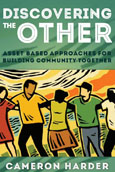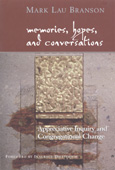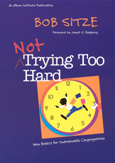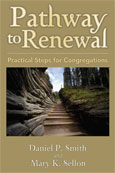I want to look more closely at the basic assumption that questions (inquiry) asked in an appreciative (positive) way have such power to change a community’s practices. I’ll look first at the power of questions, and then I’ll ask whether an appreciative approach really fits with our understanding of the brokenness of human life (the doctrine of original sin).
Questions are essentially research strategies. They outline what a congregation or community wants to know about itself and, by implication, what its possibilities are. Bad questions shut out critical information-or even misinform. In my Introduction to Theology class, I ask students to bring me a good question three times during the semester. They usually struggle with this. The first questions handed in tend to be rhetorical-comments disguised as questions. They might ask, “Why is Lutheran worship so boring?” or “Why don’t we talk more about the Holy Spirit?”
Their questions eliminate the possibility that Lutheran worship isn’t boring to others, even if it is to them, or that Lutheran discussions about the Holy Spirit are going on that they have missed out on. They assume facts not in evidence. Their questions are really just opinions looking for justification.
Either-or options are also common: “Did God create human beings or did evolution?” No matter how many real possibilities there are, these black or white questions reduce the field of possible options to only two, one of which is usually obviously preferred. (But maybe it was both God and evolution-or aliens!) Either-or questions contain embedded assumptions about what the range of answers to the question can be.
Yes-no questions aren’t particularly useful because they can be answered in one word. Appreciative inquiry tries to get at people’s stories. So the questions need to be open-ended. Don’t ask, “Is our community in good economic shape?” but “Tell about a time when you saw this community doing something effective to strengthen its economy.”
My theology students’ questions may also be diversions away from the concerns that matter most to them but are a bit scary to consider. “What if God doesn’t exist?” may be sidestepped by someone training to spend his or her life telling people about God in favor of “Is it okay to let unbaptized people come to communion?” Diversion questions often pop up in congregational debates. For several years many of our Canadian rural churches have been heatedly debating whether they should be blessing same-sex marriages-even in tiny communities where there are no gay or lesbian couples interested in marriage. Meanwhile, economic changes that are depopulating those communities and dismantling their social infrastructure go unquestioned. Energy that should be devoted to building communities under stress is going into fighting an issue whose resolution will have little or no impact on their particular community, no matter how it is resolved.
So bad questions can distort a congregation’s self-image, limit its options for action, and divert it from exploring the things that matter most. Good questions give them confidence in themselves, open up their future, and get at the heart of their community’s needs.
Jesus had a gift for spotting bad questions. His detractors were always trying to trap him with questions: “Who sinned, Rabbi: this man or his parents?” (The question assumes that all bad events are a result of personal sin, which, considering the unfortunate series of circumstances in Jesus’s life, would have branded Jesus a major league sinner.) “Should we pay taxes to Caesar?” (“Yes” would have put Jesus in trouble with his oppressed fellow Israelites; “No” would have had him in trouble with Rome.) One of my favorites, though, is the apparently innocent question asked by the lawyer in Luke 10:29: “Who is my neighbor?” If Jesus had answered this question, he would have been forced into outlining criteria as to who deserved the lawyer’s care. The question, Jesus realized, was the lawyer’s way of protecting his present lifestyle by implying that there were those who didn’t deserve his help. The lawyer wanted to avoid change yet obtain the approval of God.
Instead of answering directly, Jesus tells the parable of the good Samaritan. Then he ends with a reversed question: “Which of these three, do you think, was a neighbor to the man who fell into the hands of the robbers?” Now it is not the worthiness of others that is in question but the lawyer’s willingness to help them, regardless of who they are. Jesus’s question reveals God’s indiscriminate love at work in one whom the lawyer would normally have despised. It opens up the possibility that the lawyer’s careful retirement plan-what he had to “do to inherit eternal life” (v. 25)-might need to be drastically altered.
Good questions are also an effective way of mobilizing community energy. A leader who provides answers out of his or her personal vision has to do a lot of work to get others to sign on. Even then, people’s buy-in may be halfhearted. But good questions arouse the interest of people, who find themselves exploring their own and others’ stories. In the process they will begin to formulate their own answers (to which they are much more likely to be committed) and will begin forging connections that can serve as the nucleus of an action team.
Drafting appropriate questions within the four general areas described above is actually one of the more difficult aspects of conducting an appreciative inquiry. Here are some suggestions. First, select an area of inquiry that matters to your people. Sit down with several church and community people who are likely to see the community from different perspectives: for example a bartender, town councilor, teacher, policeman, welfare client, nurse, clergy, ex-con, and so on. Ask them, “What is happening in this town, or not happening, that is having a significant impact on our people?” Allow each to share in turn, and use their responses to focus on an area of interest that you want to pursue in an appreciative inquiry.
Then draft one main question for each of the four areas listed above: that is, best experience, core values, hopes, and commitments. A main question under best experience might be, “Tell about an experience you’ve had when you saw this community doing something effective to strengthen its economy,” or “Tell about a time when our church did something effective with our community’s youth.”
You will also need to prepare supplementary subquestions to draw out the person’s response to the main question, so to follow up on the economic question above, one might ask, “How did that approach (project, experience) strengthen our economy?” “Who was involved, and how did they get involved?” “Why did it work?” “Where or when have you seen that same approach used again?” and so on. Generally, the who, what, where, when, why, and how questions open up the conversation best. “Tell me about a time when . . .” is good for getting stories started. “Give me an example . . .” gets into important contextual details. “How did you feel when . . . ?” helps to expose the storyteller’s core values. Avoid either-or questions or any that begin with the words do or does, will, can, should, or is, which normally lead to yes or no or very brief responses. See appendix A for some examples of questions that could be used in various areas of a church-community appreciative inquiry.
Adapted from Discovering the Other: Asset-Based Approaches for Building Community Together, copyright © 2013 by the Alban Institute. All rights reserved.
Copyright © 2013, the Alban Institute. All rights reserved. We encourage you to share Alban Weekly articles with your congregation. We gladly allow permission to reprint articles from the Alban Weekly for one-time use by congregations and their leaders when the material is offered free of charge. All we ask is that you write to us at alban@div.duke.edu and let us know how Alban Weekly is making an impact in your congregation. If you would like to use any other Alban material, or if your intended use of Alban Weekly does not fall within this scope, please submit our reprint permission request form.
 Discovering the Other: Asset-Based Approaches for Building Community Together
Discovering the Other: Asset-Based Approaches for Building Community TogetherCameron Harder
What is God’s mission? Simply put, says theologian and field educator Cameron Harder, God’s mission is to form communities that reflect and embody the life of the Trinity. Discovering the Other is an introduction to two tools that community builders have found helpful: appreciative inquiry and asset mapping. These tools help congregations see that all of life is saturated by the sacred and give them energy to begin living as if it were so. Instead of asking, “What’s wrong?” appreciative inquiry asks, “What’s right?” Asset mapping asks, “What resources do you have personally that we could bring to our future together?”

Memories, Hopes, and Conversations
Mark Lau Branson
When First Presbyterian Church in Altadena, California, was asked to provide a mission study report for its pastor nominating committee, the congregation was afraid that they would find themselves engaging in busy work and producing a report that would wind up in a file gathering dust. They then asked professor Mark Lau Branson to consult with them on writing this report, who invited them to join in a process of Appreciative Inquiry—a transformational organization change process—which resulted in a major shift in congregational conversations and a new sense of hope.

Not Trying Too Hard: New Basics for Sustainable Congregations
Bob Sitze
What is a congregation for? What are members for? What are pastors for?
Bob Sitze, an evocative and sometimes whimsical writer and workshop leader, offers a new vision for congregations and their leaders—a vision that releases us from the growing burden of trying harder to invent and implement “better” worship, evangelism, stewardship, small groups, long-range planning, mission statements, and the like. Sitze argues instead that as congregations apply the insights of “simpler lifestyles” to their life together, they will find joy and fulfillment by more closely matching their expectations for ministry with personal and corporate assets.
 Pathway to Renewal: Practical Steps for Congregations
Pathway to Renewal: Practical Steps for Congregations
Daniel P. Smith, Mary K. Sellon
No pastor can lead a congregation to renewal alone. It requires a change of heart for the whole congregation. Congregational renewal occurs only when people reorient their very understanding of the nature and purpose of their church. This goes far beyond a simple retooling of the mission statement or addition of a few programs. Authors Mary Sellon and Daniel Smith lead congregations through this process of renewal, breaking down into understandable components what is happening in the people themselves that makes renewal efforts successful.
Learn more about personality types – your own and others –
and use that knowledge to motivate and equip leaders and volunteers in your congregation.
Motivating and Equipping Leaders and Volunteers: Understanding Personality Types in Your Congregation
November 12-14, 2013, Holy Family Retreat Center, West Hartford, CT
Leader: Linda Rich, Alban consultant
